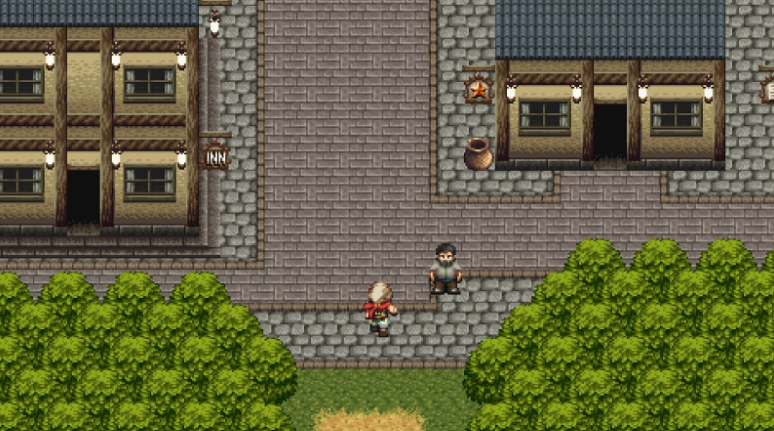It’s been years since the JRPG had the same clout it used to. Unfortunately, the near 10 hour journey through the world of Chronus Arc does little to aid this.
Hit-Point Co. struggle to capture the same sense of awe and emotional story telling that the classics in the past have. In an attempt to capture nostalgia and build upon the foundations lain decades ago, Chronus Arc never seems to succeed as much as it aims to. With problematic balancing, an inconsistent story and odd design choices, the game struggles to add anything new to the popular genre.
While Chronus Arc struggles in many areas, the artstyle is not one of them. We are treated to colorful environments, expressive sprite art and impressive battle animations. Not as high budget as the gems of yesteryear, the game makes do with what tools it has and it flourishes. The various enemy designs are easy to read, never putting you at a loss as to how to best them. And even though enemy sprites do get reused, they never feel cheap, and you are often treated to a different colored sprite that corresponds to a different element. This makes the repeats that you see a little less boring.
The music finds itself in a similar spot as the artstyle. While it gets reused a lot, with there being rather few tracks included, the ones that we do hear are great. The town square theme in particular – one that you are treated to for each town you visit – is an example of the quality work put into this game. Successfully creating that homey feeling you crave when playing an experience like this. But while the building blocks are solid, the same can’t be said for the rest of the experience.
The story is where the cracks in Chronus Arc start to become visible, even though the premise is solid. Every 10 years, the Houra god rewinds time, repairing broken items and heirlooms blessed by the gods. This is by creating what is essentially a save state of the world, and every ten years brings aspects that were saved back over into our world. In order for this to work, you need to collect the chronus fragments and perform a ceremony. You play as Loka, an apprentice to the Sorcerer Knight, Teth. This is the first time that you get the chance to go out and retrieve these fragments, and naturally he goes with his mentor, who he uncomfortably calls Master constantly. Things turn sideways when an unknown man shows up, brainwashes your mentor and steals the fragment. You then spend the roughly 10 hour journey chasing him down, killing and fighting almost all that stand in your way, while also learning about both you and your compatriots’ pasts.
This is a great premise that has so much promise. You could go into why the gods do this every 10 years, or what happens if the ceremony is not performed, forever more. But unfortunately the story never asks these questions, and instead you are given a simple goal and it never progresses much more than that. You get some backstory and then are sent off on your merry way to trot the globe collecting these fragments, never seeing the tale go far enough to be especially grabbing.
It isn’t helped by its lackluster characters and dialogue either. You are introduced to two rather bland characters that add little to the story. Sarna is your best friend and also Princess of your home kingdom. The interactions between Sarna and Loka are often written out with very stilted dialogue, making their 10+ year long friendship unbelievable. Then you are treated to Kuril, a young performer who is given the most growth throughout. Her story deals with the disappearance of her father, and forgiving someone who has wronged her in an unforgivable way. But like Sarna, the writing works against Kuril, making her unlikable and far too childish.
Chronus Arc’s gameplay shares the same fate as the story; great promise but poor execution. The gameplay itself comes in two varieties, spread across both dungeon puzzles and the classic JRPG combat system, and the latter is a pretty robust battle system that allows you to adjust your party to your playstyle. The main way the game does this is through its versatile class system. There are four different classes you can play as; the warrior, sorcerer, cleric or assistant, and they all offer unique abilities that you can’t get otherwise. There is also a further special class that you can unlock later in the game that gives you access to a ton of new abilities that can devastate enemies. When you decide you want to change a class, you get reset to level 1, but your stats are improved and are better than they were when you were originally starting off. This allows you to keep some of that power you felt before, while allowing the chance to build off of that. You get to keep any learned abilities from previous classes, and are able to do this over and over again. But while in theory all of that sounds good, in practice it does not work all that well.
In order to change classes you have to build up a currency – Mana. You earn this by killing enemies, with 1 Mana gained for every 5 foes killed. But before you can change your class, you have to buy a tome for 50 Mana. The problem is that this means you have to kill 250 enemies before you can do anything, and with a max of 4 enemies per battle, you can be sitting there grinding out random encounters or dungeon encounters for a long time. This is made even worse when trying to unlock the unique character specific class for 100 Mana. While you can find these books in chests, they are very few and far between.
Mana is also used to buy other items, such as stat upgrades and equipment, one of which gives you twice the experience points. And this is where the game’s largest faults start to show. Leveling up until level 30 is not too difficult and doesn’t feel like it takes too long, but after that though, progress grinds to a halt. Eventually, even when equipping a member with the 2x experience ring, it can feel like you are never progressing, and when you do, the ability unlocks also begin slowing down. The solution for this is turning to the paid DLC that allows you to turn on the option for earning 3x experience. This costs $4.99 itself, and the game also offers a host of other payable options to make things easier – 2x damage, extra resources when mining and the option for full restoration of health and MP after battles. Through my near 10 hour experience, I felt almost pressured to buy these options.
The difficulty ramps up constantly too. Where in one area you would be able to get by with no problem, five minutes later, you are getting one hit ko’ed by an enemy. The difficulty spikes in Chronus Arc happen far to often, and are far to severe, leaving you to grind more and more, with less and less efficiency. Luckily, the game over system is extremely forgiving, not kicking you to your last save, and instead putting you right before the battle. This thankfully allows you to leave and go grind some levels if you continuously die to a tough boss without losing any progress.
The other style of gameplay included, Chronus Arc’s attempt at dungeon puzzles, fairs a little bit better. The puzzles come in two standard styles, pushing boxes and putting jars on buttons; sometimes combining the two. For the most part these are welcome distractions and serve as good additions. With the exception of a couple of specific puzzles, none are too difficult, leaving you satisfied after solving them. To make things easier, the game gives you the ability to restart the current room by pressing the LB button, which puts the puzzle in its original state if you’ve messed with it so much that you’ve lost the picture. This is extremely helpful, because when dealing with the boxes, puzzlingly you can only push them. This becomes an issue because its very easy to push the box into a position that you no longer can move it. With zero ability to pull boxes, some puzzles can lead to frustration, especially should you find yourself in a position which sees you almost having solved the test, to only accidentally push a box too far and have to start over. Luckily, despite this, puzzles tend never overstay their welcome, and are not common enough to become a nuisance.
All of this points to Chronus Arc being a truly mixed bag. There are some great ideas that Hit-Point Co. have put out, but they never fully hit the mark. Both the combat and class system are solid additions to the genre, but the balancing and questionable design choices hold it back from fully reaching its potential. With an interesting world set up, I would love to see another game in this series, possibly taking more risks with the story.
In the end, while not a terrible way to spend a weekend playing through, its hard to see Chronus Arc coming with a huge recommendation.











